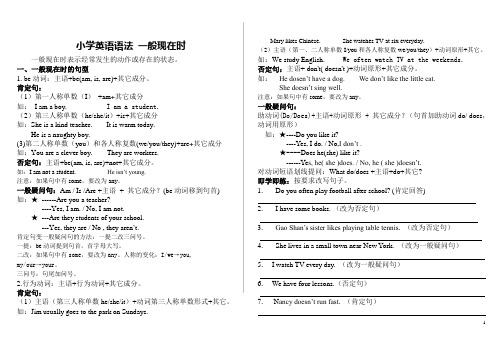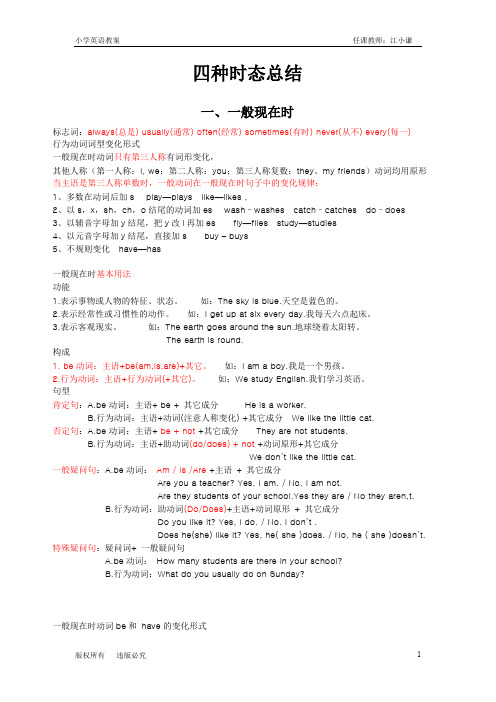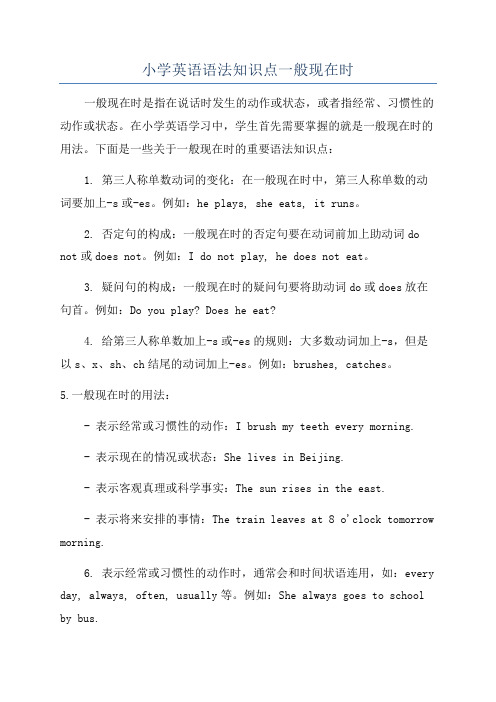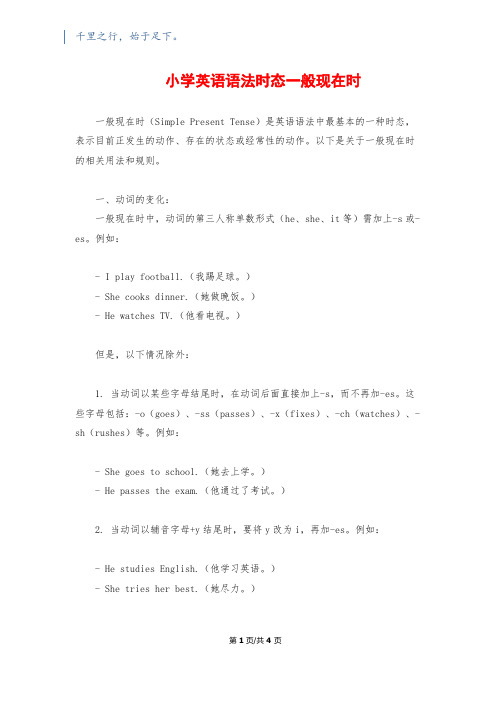小学英语语法:一般现在时
小学英语语法_一般现在时

小学英语语法一般现在时一般现在时表示经常发生的动作或存在的状态。
一、一般现在时的句型1. be动词:主语+be(am, is, are)+其它成分。
肯定句:(1)第一人称单数(I)+am+其它成分如:I am a boy. I am a student.(2)第三人称单数(he/she/it)+is+其它成分如:She is a kind teacher. It is warm today.He is a naughty boy.(3)第二人称单数(you)和各人称复数(we/you/they)+are+其它成分如:You are a clever boy. They are workers.否定句:主语+be(am, is, are)+not+其它成分。
如:I am not a student. He isn’t young.注意:如果句中有some,要改为any。
一般疑问句:Am / Is /Are +主语+ 其它成分?(be动词移到句首) 如:★------Are you a teacher?----Yes, I am. / No, I am not.★---Are they students of your school.---Yes, they are / No , they aren’t.肯定句变一般疑问句的方法:一提二改三问号。
一提:be动词提到句首,首字母大写。
二改:如果句中有some,要改为any。
人称的变化:I/we→you,my/our→your。
三问号:句尾加问号。
2.行为动词:主语+行为动词+其它成分。
肯定句:(1)主语(第三人称单数he/she/it)+动词第三人称单数形式+其它。
如:Jim usually goes to the park on Sundays.Mary likes Chinese. She watches TV at six everyday.(2)主语(第一、二人称单数I/you和各人称复数we/you/they)+动词原形+其它。
(完整版)小学英语时态总结

四种时态总结一、一般现在时标志词:always(总是) usually(通常) often(经常) sometimes(有时) never(从不) every(每一)行为动词词型变化形式一般现在时动词只有第三人称有词形变化,其他人称(第一人称:I, we;第二人称:you;第三人称复数:they、my friends)动词均用原形当主语是第三人称单数时,一般动词在一般现在时句子中的变化规律:1、多数在动词后加s play—plays like—likes ,2、以s,x,sh,ch,o结尾的动词加es wash–washes catch–catches do–does3、以辅音字母加y结尾,把y改i再加es fly—flies study—studies4、以元音字母加y结尾,直接加s buy – buys5、不规则变化have—has一般现在时基本用法功能1.表示事物或人物的特征、状态。
如:The sky is blue.天空是蓝色的。
2.表示经常性或习惯性的动作。
如:I get up at six every day.我每天六点起床。
3.表示客观现实。
如:The earth goes around the sun.地球绕着太阳转。
The earth is round.构成1. be动词:主语+be(am,is,are)+其它。
如:I am a boy.我是一个男孩。
2.行为动词:主语+行为动词(+其它)。
如:We study English.我们学习英语。
句型肯定句:A.be动词:主语+ be + 其它成分He is a worker.B.行为动词:主语+动词(注意人称变化) +其它成分We like the little cat.否定句:A.be动词:主语+ be + not +其它成分They are not students.B.行为动词:主语+助动词(do/does) + not +动词原形+其它成分We don’t like the little cat.一般疑问句:A.be动词:Am / Is /Are +主语+ 其它成分Are you a teacher? Yes, I am. / No, I am not.Are they students of your school.Yes they are / No they aren,t.B.行为动词:助动词(Do/Does)+主语+动词原形+ 其它成分Do you like it? Yes, I do. / No. I don’t . Does he(she) like it? Yes, he( she )does. / No, he ( she )doesn’t.特殊疑问句:疑问词+ 一般疑问句A.be动词:How many students are there in your school?B.行为动词:What do you usually do on Sunday?一般现在时动词be和have的变化形式1.动词Be 叫连系动词, 用法:第一人称单数用am,第三人称单数用is,其它人称用are。
小学英语语法一般现在时总结

千里之行,始于足下。
学校英语语法一般现在时总结学校英语语法一般现在时总结一般现在时是英语中最基础和最常用的时态之一,它用来表达经常性的、重复性的或普遍性的动作或状态。
在学校英语学习中,同学们需要把握一般现在时的用法和构造。
一般现在时的构造:一般现在时的确定句的构造为:主语 + 动词原形(第三人称单数要加-s 或-es)+其他。
例句:I play football every day.He plays football every day.She watches TV on weekends.一般现在时的否定句的构造为:主语 + do not / does not + 动词原形 +其他。
例句:I do not play football every day.He does not play football every day.She does not watch TV on weekends.一般现在时的疑问句的构造为:Do / Does + 主语 + 动词原形 +其他?例句:Do you play football every day?Does he play football every day?Does she watch TV on weekends?一般现在时的用法:1. 表示经常性的动作或习惯。
第1页/共3页锲而不舍,金石可镂。
例句:I brush my teeth before going to bed.She always eats an apple in the morning.They usually walk to school.2. 表示普遍性的事实或真理。
例句:Water boils at 100 degrees Celsius.The sun rises in the east.Dogs are loyal animals.3. 表示现阶段的状态。
例句:I am a student.She is a teacher.They are happy.4. 描述行程支配或固定时间的动作。
小学英语语法-一般现在时详细讲解

小学英语语法-一般现在时详细讲解一般现在时是英语语法中最基础也是最常用的时态之一。
它表示的是习惯性、经常性和普遍性的行为或状态。
在本文中,我将详细介绍一般现在时的形式、用法和注意事项。
一、一般现在时的形式一般现在时的肯定句的基本结构是:主语+谓语动词+其他。
谓语动词在第三人称单数形式时要加上-s或-es。
例如:- I eat breakfast every morning.(我每天早上吃早饭。
)- She goes to school by bus.(她坐公共汽车去学校。
)否定句的结构是:主语+do not/does not+动词原形+其他。
例如:- I do not like coffee.(我不喜欢咖啡。
)- He does not play football.(他不踢足球。
)疑问句的结构是:Do/Does+主语+动词原形+其他?例如:- Do you like ice cream?(你喜欢冰淇淋吗?)- Does she go to the park every weekend?(她每个周末去公园吗?)二、一般现在时的用法第1页/共4页1. 表示习惯或经常性的动作:- I write in my diary every night.(我每天晚上写日记。
)- They play basketball every Sunday.(他们每个星期天打篮球。
)2. 表示客观事实、自然规律或科学真理:- Water boils at 100 degrees Celsius.(水在100摄氏度时煮沸。
)- The sun rises in the east.(太阳从东方升起。
)3. 表示感觉、想法和喜好:- I love chocolate.(我喜欢巧克力。
)- He hates to wake up early.(他讨厌早起。
)4. 表示现时状态或现时临时的动作:- I am a student.(我是一个学生。
小学英语语法_一般现在时详细讲解

千里之行,始于足下。
学校英语语法_一般现在时具体讲解一般现在时(Simple Present Tense)是英语中最基本的时态之一,用来表达经常性或习惯性的动作、客观事实、常规活动等。
以下是一般现在时的具体讲解。
1. 构成:主语 + 动词原形(第三人称单数要在动词后加-s)+ 其他。
例如:- I play soccer on weekends.(我周末踢足球。
)- He watches TV every evening.(他每天晚上看电视。
)2. 主语:一般现在时的主语可以是第一人称、其次人称或第三人称。
例如:- I go to school every day.(我每天去上学。
)- You like ice cream.(你宠爱冰淇淋。
)- She plays the piano well.(她弹得很好。
)3. 动词的变化:- 第三人称单数一般在动词后面加上-s或-es。
例如:he/she/itplays(he plays,she plays,it plays),he/she/it watches(he watches,she watches,it watches)。
- 一般现在时的否定形式是在动词前面加上do not(don’t)或does not(doesn’t)。
例如:I do not dance(我不跳舞),She does not like coffee(她不宠爱咖啡)。
- 一般现在时的疑问形式是把do或does放在主语前面。
例如:Do you play tennis?(你打网球吗?),Does she go to the gym?(她去健身房吗?)4. 使用场景:第1页/共2页锲而不舍,金石可镂。
- 表达经常性或习惯性的动作。
例如:I eat breakfast every morning.(我每天早上吃早餐。
)- 表达客观事实、普遍真理等。
例如:The sun rises in the east.(太阳从东方升起。
小学英语语法知识点一般现在时

小学英语语法知识点一般现在时一般现在时是指在说话时发生的动作或状态,或者指经常、习惯性的动作或状态。
在小学英语学习中,学生首先需要掌握的就是一般现在时的用法。
下面是一些关于一般现在时的重要语法知识点:1. 第三人称单数动词的变化:在一般现在时中,第三人称单数的动词要加上-s或-es。
例如:he plays, she eats, it runs。
2. 否定句的构成:一般现在时的否定句要在动词前加上助动词do not或does not。
例如:I do not play, he does not eat。
3. 疑问句的构成:一般现在时的疑问句要将助动词do或does放在句首。
例如:Do you play? Does he eat?4. 给第三人称单数加上-s或-es的规则:大多数动词加上-s,但是以s、x、sh、ch结尾的动词加上-es。
例如:brushes, catches。
5.一般现在时的用法:- 表示经常或习惯性的动作:I brush my teeth every morning.- 表示现在的情况或状态:She lives in Beijing.- 表示客观真理或科学事实:The sun rises in the east.- 表示将来安排的事情:The train leaves at 8 o'clock tomorrow morning.6. 表示经常或习惯性的动作时,通常会和时间状语连用,如:every day, always, often, usually等。
例如:She always goes to school by bus.7. 表示现在的情况或状态时,通常与be动词连用,如:am, is, are。
例如:I am a student.8. 表示客观真理或科学事实时,通常不和时间状语连用。
例如:Water boils at 100 degrees Celsius.9.一般现在时中的一些特殊用法:- 示意要求或建议的动词(如:want, need, like, love, hate等)后接不定式,用法类似于祈使句。
小学英语语法时态讲解与归纳一般现在时

千里之行,始于足下。
小学英语语法时态讲解与归纳一般现在时一般现在时(Simple Present Tense)是表示经常性、习惯性或普遍性的动作或状态的时态。
它用于描述我们现在经常或总是发生的动作、习惯、经验、事实和固定的真理。
下面是小学英语语法时态讲解与归纳一般现在时的内容:1. 构成一般现在时的肯定句结构为:主语 + 动词原形(第三人称单数加-s)+ 其他。
例如:- I play soccer every Saturday.(我每个星期六踢足球。
)- She eats an apple every morning.(她每天早上吃一个苹果。
)2. 第三人称单数的变化在一般现在时中,第三人称单数的动词要加上-s、-es或-ies。
例如:- She plays soccer every Saturday.(她每个星期六踢足球。
)- He eats an apple every morning.(他每天早上吃一个苹果。
)- My brother watches TV every night.(我的哥哥每天晚上看电视。
)3. 否定句和疑问句第1页/共3页锲而不舍,金石可镂。
- 否定句:在动词前加do not(don't)或does not(doesn't)。
例如:- I don't play soccer every Saturday.(我不是每个星期六踢足球。
)- She doesn't eat an apple every morning.(她不是每天早上吃一个苹果。
)- 疑问句:将助动词do(does)提到主语前。
例如:- Do you play soccer every Saturday?(你每个星期六踢足球吗?)- Does she eat an apple every morning?(她每天早上吃一个苹果吗?)4. 频率副词频率副词用来修饰动词,表示动作发生的频率。
小学英语语法时态一般现在时

小学英语语法时态一般现在时一般现在时(Simple Present Tense)是英语语法中最基本的一种时态,表示目前正发生的动作、存在的状态或经常性的动作。
以下是关于一般现在时的相关用法和规则。
一、动词的变化:一般现在时中,动词的第三人称单数形式(he、she、it等)需加上-s或-es。
例如:- I play football.(我踢足球。
)- She cooks dinner.(她做晚饭。
)- He watches TV.(他看电视。
)但是,以下情况除外:1. 当动词以某些字母结尾时,在动词后面直接加上-s,而不再加-es。
这些字母包括:-o(goes)、-ss(passes)、-x(fixes)、-ch(watches)、-sh(rushes)等。
例如:- She goes to school.(她去上学。
)- He passes the exam.(他通过了考试。
)2. 当动词以辅音字母+y结尾时,要将y改为i,再加-es。
例如:- He studies English.(他学习英语。
)- She tries her best.(她尽力。
)第1页/共4页3. 当动词以-e结尾时,只需加上-s。
例如:- They write letters.(他们写信。
)- He can dance.(他会跳舞。
)二、用法:1. 描述客观事实或经常性动作:一般现在时常用于描述客观事实或经常性动作。
例如:- Water boils at 100 degrees Celsius.(水沸腾的温度是100摄氏度。
)- I usually go to bed at 10 o'clock.(我通常在10点钟上床睡觉。
)2. 描述现阶段的状态:一般现在时还可用来描述现阶段的状态或对现实情况的评论。
例如:- They live in New York.(他们住在纽约。
)- She looks tired.(她看起来很累。
- 1、下载文档前请自行甄别文档内容的完整性,平台不提供额外的编辑、内容补充、找答案等附加服务。
- 2、"仅部分预览"的文档,不可在线预览部分如存在完整性等问题,可反馈申请退款(可完整预览的文档不适用该条件!)。
- 3、如文档侵犯您的权益,请联系客服反馈,我们会尽快为您处理(人工客服工作时间:9:00-18:30)。
二、改写句子
1.I want to play table tennis with Gao Shan. wants He _____ to … 2. I surf the Internet on Saturday evening.. My father surfs the… 3. They study English , Maths Science ,and Art. Tom studies English… 4. I usually play basketball with my friends. Wang Bing plays …
How do you spell it? 特殊疑问句: 疑问词+一般疑问句 How does he spell it?
直接回答,而不用yes 或no.
5.一般现在时的句型变换
1) I usually play football on Friday.
改为一般疑问句: Do you usually play football on Friday?
我的功能
1. 表示经常性、习惯性的动作或状态
I wash the dishes every day. You sometimes take a bus home. They usually have lunch at 11:30. He always gets up early. She is often late for school.
have 19. Su Hai and Su Yang ______ (have) eight subjects this term. does 20. What ______ she usually ______ (do) do in the evening? studies She usually ______ (study) English.
4) 特殊疑问句: 疑问词+ do/does+主语+动词原形+其他? 如: What do you want? What does she want? What time do you have lunch? What time does she have lunch? What do you do? What does she do?
3) 一般疑问句及其肯、否定回答: Do+主语(I/we/you/they)+动词原形+其他? 如:Do you stay at home on Saturdays? Yes,I do./No,I don’t. Do they have sports every day? Yes, they do./No, they don’t. Does+主语(he/she/it)+动词原形+其他? 如:Does he stay at home on Saturdays? Yes,he does./No,he doesn’t. Does Lucy have sports every day? Yes,he does./No,he doesn’t.
2. be 动词的一般现在时的基本句型
肯定句:主语+be+其它
如: He is a worker.
You are thirteen.
否定句:主语+ be+ not+其它
如: He is not a worker. You aren’t thirteen.
一般疑问句:Be+主语+其它?
如: Is he a worker? Yes, he is./No, he isn’t. Are you thirteen? Yes, I am ./No, I am not.
4、实义动词的一般现在时的基本句型 1) 肯定句:
主语(I/We/You/They)+实义动词原形+其他 如:I stay at home on Saturdays. They have sports every day.
主语(He/She/It)+实义动词单三形式+其他 如:He stays at home on Saturdays. Lucy has sports every day.
do 9. What ______you usually ______ (do) after do school? grow I usually ______ (grow) flowers. does do 10. What ______your mother usually ______ (do) on Sundays? does She usually ______ (do) housework at home . Does have 11. ______ Mike ______(have) any hobbies? does Yes, he ______ . likes cooking He ______ (like) ______ (cook). have 12. They______ (have) the same hobby.
{
行为动词原形 (+其它)。
行为动词的单数第三人称形式
如:We study English.我们学习英语. He studies French.
3、实义动词第三人称单数的动词形式变化规则
一般情况下直接加-s
walk—walks
以s. x. sh. ch. o尾 watch—watches 加-es go—goes “辅音字母+y”结尾 fly—flies 变y为i, 再加-es, 特殊情况 have→has do→does go→goes
goes 16. She ______ (go) to school from Monday to Friday. does 17. Liu Tao ______ (do) not like PE. He can’t run ______(run ) fast. watch 18. The children usually ______ (watch) TV in the evening.
对划线部分提问: What do you usually do on Friday?
2) My father go to work by bike everyday. 对划线部分提问: How does your father go to work everyday?
6. 实义动词的一般现在时用法小结 谓语动词是实义动词时, 其一般 现在时的谓语动词形式有两种—— 第三人称单数或原形。其否定句和 疑问句要借助于does或do来帮助构成。
2. 表示表示客观事实
You are 13. He is a student. You study at Olympic Garden Middle School.
3. 表示永恒不变的真理;
The moon goes round the earth.
always(总是) often(经常) hardly(几乎不) never(从不) every year(每年) on Monday(在星期一)
likes reading 13. My aunt ______ (like) ______ (read) newspapers every evening . does do 14. What ______Mike usually ______ (do) on Sundays? helps He usually ______ (help) Jane with her Maths . does do 15. What ______Helen usually ______ (do) on Sundays? cleans She usually ______ (clean) the desk .
24.We usually play dance ______( dance )and______( play )bask etball after class. hobby 25. Mike’s______ ( hobby ) is drawing ______ draw ) pictures.
do do 5. What ______they usually ______ (do) on Saturdays? fly They usually ______ (fly) kites. water Does 6. ______ your uncle______ (water) the flowers every day? Do read 7. ______ your parents______ (read) newspapers every day? teaches 8. The girl usually ______ (teach) us English on Sundays.
我们已学过的be 动词可译成“是”,
有时译成“成为”,有时则没有具体意 思如: “She is tall.”这句译成: “她很 高”。故be 动词不属于实义动词。
2、一般现在时实义动词作谓语的时侯有两种形式:
1. 动词原形;如: enjoy 2. 第三人称单数动词形式;如: enjoys
主语 +
21.The girl isbeautiful . She dances ______ ______ beautifully ____________ .(beautiful) 22. The student uses ______ (use) a computer to write ______(write) music. like 23. I______ ( like ) making clothes, but he________________ (do not like ). does not like likes He ______ ( like ) playing football.
